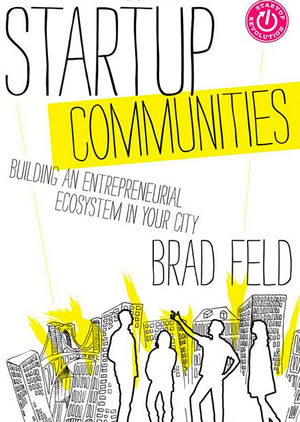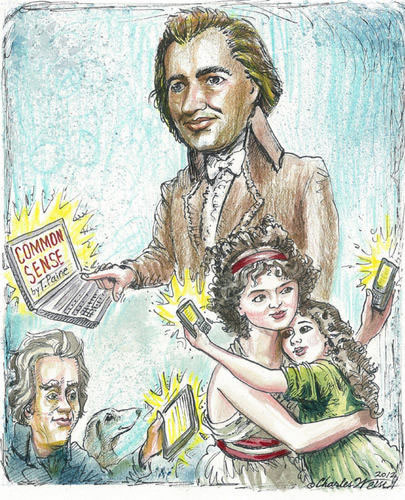
In case you don’t get the reference, this should help:

In case you don’t get the reference, this should help:

“And Luke…stop having impure thoughts about your sister.”
Photo by Matthew Paul Turner, found via io9. Click to see the original.
I wish I’d thought up this display back when I was in Catholic school.

I must say that The Green Mile is my favourite. I’ll give honourable mentions to Fat Albert and Blood Sport.
Click the photo above to register for the event.
 Brad Feld, managing director at Foundry Group, cofounder of TechStars, investor, entrepreneur and author of so many books with colons in the title:
Brad Feld, managing director at Foundry Group, cofounder of TechStars, investor, entrepreneur and author of so many books with colons in the title:
is appearing in Toronto on Tuesday, October 30that 6:00 p.m. in the Toronto Reference Library at an event being put together by the find folks at Startup North and with the help of a lot of sponsors.
The evening will feature cocktails, networking and a discussion on how to make Toronto a better place for startups. There’s a $25 registration fee for this event, which includes a copy of Startup Communities: Building an Entrepreneurial Ecosystem in Your City in either dead-tree or DRM’d PDF format (the Canadian list price for the hardcover edition is $30, so it’s a pretty good deal).
William Mougayar recently wrote a review of Startup Communities in the Startup North blog, in which he explains Feld’s “Boulder Thesis”, which he describes as “a fresh framework that is based on pragmatism and lower barriers of entry” and “all about on-the-ground reality as a lever to making things happen.” Feld prefers real get-stuff-done events such as “hackathons, New Tech Meetups, Open Coffee Clubs, Startup Weekends, and accelerators” over more-fluff-than-stuff ones like “entrepreneurial award events, periodic cocktail parties, monthly networking events, panel discussions, and open houses”, arguing that they “go deeper into the entrepreneurial stack”.
 I’ll be in Mirvish Village tonight to catch the book launch of NewTown, the new novel by my old Crazy Go Nuts University classmate A.G. Pasquella. His previous novel, Why Not a Spider Monkey Jesus?, a tale of science gone wrong and primate televangelism gone even more so, was a hoot; I expect no less from his latest offering.
I’ll be in Mirvish Village tonight to catch the book launch of NewTown, the new novel by my old Crazy Go Nuts University classmate A.G. Pasquella. His previous novel, Why Not a Spider Monkey Jesus?, a tale of science gone wrong and primate televangelism gone even more so, was a hoot; I expect no less from his latest offering.
Here’s a quick description of NewTown:
As The World burns: a cybernetic man-plane does the dishes. A chef muses about the best way to cook space horse. A mad scientist bemoans the loss of his robot army. Another mad scientist plots to create fireproof cows. A teenage boy teleports toward the girl of his dreams. Can any of them unlock the secrets of NewTown?
The launch takes place tonight from 7:00 p.m. to 10:00 p.m. at the Victory Cafe (581 Markham Street, just west and south of Bathurst Station) and will feature readings and performance from A.G. himself, along with special guests Shari Kasman, Michael Murray, Jacqueline Valencia.

Allan Gregg, pollster (he founded Decima Research, which eventually became Harris/Decima), political commentator, social researcher and former political strategist (he helped lead Brian Mulroney’s Conservatives to victory in 1984), gave a lecture at Carleton University at the opening of its new Public Affairs Building in September. It’s titled 1984 in 2012: The Assault on Reason, and it’s a worthwhile read.
This excerpt gives the main point of his lecture:
I have spent my entire professional life as a researcher, dedicated to understanding the relationship between cause and effect. And I have to tell you, I’ve begun to see some troubling trends. It seems as though our government’s use of evidence and facts as the bases of policy is declining, and in their place, dogma, whim and political expediency are on the rise. And even more troubling …. Canadians seem to be buying it.
My concern was first piqued in July 2010, when the federal cabinet announced its decision to cut the mandatory long form census and replace it with a voluntary one. The rationale for this curious decision was that asking citizens for information about things like how many bathrooms were in their homes was a needless intrusion on their privacy and liberty. One might reasonably wonder how knowledge about the number of toilets you have could enable the government to invade your privacy, but that aside, it became clear that virtually no toilet owners had ever voiced concerns that the long form census, and its toilet questions, posed this kind of threat.
Again, as someone who had used the census – both as a commercial researcher and when I worked on Parliament Hill – I knew how important these data were in identifying not just toilet counts, but shifting population trends and the changes in the quality and quantity of life of Canadians. How could you determine how many units of affordable housing were needed unless you knew the change in the number of people who qualified for affordable housing? How could you assess the appropriate costs of affordable housing unless you knew the change in the amount of disposal income available to eligible recipients?
And even creepier, why would anyone forsake these valuable insights – and the chance to make good public policy – under the pretence that rights were violated when no one ever voiced the concern that this was happening? Was this a one-off move, however misguided? Or, the canary in the mineshaft?
He points to a pattern in cuts being made by Prime Minister Harper’s government — to Statistics Canada, the Library and Archives of Canada, research (particularly environmental research) — as well as its suppression of scientific findings and what appears to be systematic attacks on evidence-based research.
This pattern, he argues, is matched by a complementary one: of dogma, fear and 1984-style misdirection, where institutions do the exact opposite of their names, all in the name of protecting the citizenry. The Ministry of Peace runs the war, the Ministry of Truth deals in propaganda and the Ministry of Love specializes in torture. He lists the names of some recent bills whose names could’ve been coined by IngSoc:
Bill C-5 is entitled “The Continuing Air Service for Passengers Act”. Substantively, it offers no such guarantee but unilaterally extended the contract of the National Automobile, Aerospace, Transport and General Workers Union of Canada and removed any prospect of a lockout or strike.
Bill C-10 is “An Act to Enact the Justice for Victims of Terrorism” and sub-titled “The Safe Streets and Communities Act”. Again forgetting for a moment that there are more victims of swimming pool drowning than terrorism, this is an Omnibus Bill which, among other things, stiffens penalties for possession of pot and builds more prisons.
Bill C-18 is called the “Marketing Freedom for Grain Farmers Act”. It dismantled the Canadian Wheat Board.
Bill C-26 boasts that it is “The Citizens Arrest and Self-Defense Act” and it is the closest we come in Canada to replicating Florida’s odious Stand Your Ground legislation.
The purpose of Bill C-30 is stated to be “The Protect Children from Internet Predators Act” and it, among other things, forces ISPs to hand over their user names to police without a warrant. When opponents protested this deliberate obfuscation, Safety Minister Vic Toews famously countered that “you are either with us or the child pornographers”.
Reason, science, knowledge and evidence, Gregg argues, are a far better basis for a society than dogma and orthodoxy. He ends his lecture as well as In Defence of Reason, a summary recently published in the Toronto Star, by stating that the way to defend reason is to participate in public discourse, and that the internet is our best tool for doing so.
Both are good reads, and worth your while: